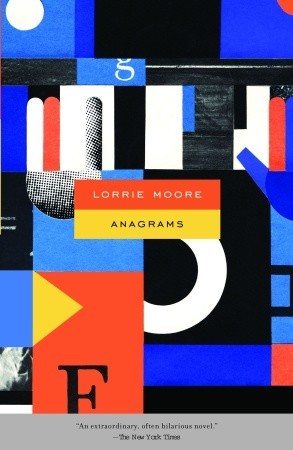Review: Lorrie Moore’s “Anagrams”
by Miles Raymer
Lorrie Moore’s Anagrams is nothing short of a masterpiece––the perfect book to save me from of a recent string of novels that didn’t cut the mustard. A befitting analysis would require a high degree of literary scrutiny, something I am probably too many years removed from my college days to muster. But I will trot out what I can.
As one might expect from the title, Anagrams is a hard book to pin down. In its simplest form, it is a novel about love and loss, and how those things are just as much imaginary as they are real. The story focuses on Benna and Gerard. These sometime-lovers are locked in orbit, like two galaxies colliding, their constituent parts too scattered for intimate contact even as they tear each other apart. Part One offers several scenarios where Benna and Gerard are both present, but with slightly different personal connections, locations, and occupations. Each of these anagramic iterations creates its own insular universe while still bleeding thematically and emotionally into the others. In Part Two, we get a more consistent (although still untraditional) storyline that carries the reader through the remainder of the novel. Such stylistic changeups often prove jarring, but in this case Moore transforms something already great into something undeniably brilliant.
Moore’s prose is impeccable, displaying deft pacing and emotional punch that many modern authors imitate but few perfect. It is not an exaggeration to say this is one of the most exquisitely-written novels I have ever had the pleasure to encounter. Here are some of my favorite passages:
Where does love go? When something you have taped on the wall falls off, what has happened to the stickum? It has relaxed. It has accumulated an assortment of hairs and fuzzies. It has said Fuck it and given up. It doesn’t go anywhere special, it’s just gone. Energy is created, and then it is destroyed. So much for the laws of physics. So much for chemistry. So much for not so much. (75, emphasis hers)
Sometimes as I’m drifting toward sleep, in the beginnings of that dissolution, I wonder where I am, when this is, and realize that at these moments I could be anywhere, anytime, for all I know: eight and napping in the trailer, my broken arm in a cast, or thirteen at night clutching a pillow to my neck, or twenty in the arms of my boyfriend, or twenty-seven in the arms of my husband, or thirty-three next to my imaginary daughter; at every place in the whole spinning shape that is my life, when I am falling asleep, I am the same person, an identical awareness, the same fuzzball of mind, the same muck of nerves, all along the line. I forage through my life and everywhere––there, there, and there––it is only me in it, the very same me, the same harmless lump, the same soggy weirdo, the same sleeping, breathing bun. (104)
At night it’s cold and I sit out on the steps of my front porch, listen to the leaves drop, like the beginning of rain. I suck on my cigarette, its false restorative, the dry papery sponge, the sucking finger of love. I exhale in the direction of the streetlight and what I see, what is formed, is a sort of halo, a luminous flower, splayed ghostly starfish! for a moment and then it floats off into the hydrangea. I repeat this, breathing on my cigarette, blowing upward into the light: At night all ghosts, all angels, haloes, luminous flowers are this nicotined dust against the streetlamp. (113)
A line [of poetry] is like a lifeboat––only a limited number of words get to go in it and you have to decide which word-lives are most valuable; the rest die. (116)
All of life seems to me a strange dream about losing things you never had to begin with. About trying to find your glasses when you can’t see because you don’t have your glasses on. That is what it seems. (206)
I think, This is why a woman makes things up: Because when she dies, those lives she never got to are all going down with her. All those possibilities will just sit there like a bunch of schoolkids with their hands raised and uncalled on––each knowing, really knowing, the answer. (225, emphasis hers)
As you might have gathered, Anagrams is a very sad book. But it is also hilarious––laugh out loud, tummy-rippling funny. Some of the wordplay is as good as anything in Shakespeare, and not a page goes by without something to tickle, tantalize, or terrify the reader’s psyche. Stunning insights about the nature of feminism, sex, Marxism, racism, war, identity, education, poetry, and many other subjects abound.
Anagrams rearranged and returned me to myself in the way that only a perfect novel can. Moore’s passion and confusion saturate the text. It is one of those rarefied works that makes love to the absurdity of consciousness and the universe that blindly birthed it, wrenching meaning from every atom in defiance of the futility that dominates the cold darkness of real life.
Rating: 10/10
